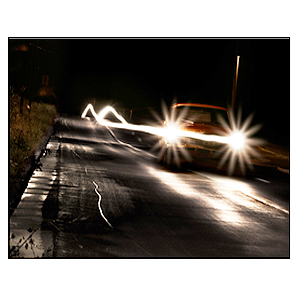
Reckless Driving & Colorado Car Accidents
Learn how to recover maximum compensation after a reckless driving accident in Colorado
Reckless driving is a term used to describe a number of preventable behaviors that have severe consequences for drivers and passengers alike.
In Colorado, reckless driving is a crime that can involve the operation of an automobile, electric bike, bicycle, electric scooter or motorcycle. According to Colorado law, a person can be charged with reckless driving if they operate a motor vehicle wantonly or with willful disregard for the safety of other individuals or property.
This article will discuss various forms of reckless driving and their impact on injuries and compensation in personal injury lawsuits.
Examples of reckless driving
Behaviors are generally considered reckless driving if the behavior shows an intentional disregard for the safety of others.
Speeding is perhaps the most common form of reckless driving. Ignoring posted speed limits and following too closely behind other vehicles can result in serious accidents and injuries. In fact, according to the National Highway Traffic Safety Administration (NHTSA), in 2020 alone, 11,258 people lost their lives as a result of someone speeding.
Speeding doesn’t just involve operating a vehicle over the posted speed limit. Road and weather conditions must also be factored in when deciding how fast a vehicle can be operated safely.
Some other behaviors that could potentially lead to a reckless driving charge include the following:
- Illegal turns or lane changes. Turning or changing lanes without proper signaling is one of the most common forms of reckless driving. By failing to use a vehicle’s turn signal and/or hand signals, along with ensuring there is enough distance to complete the maneuver, the person operating a motor vehicle is putting the safety of others at risk.
- Abrupt braking. By slamming on the brakes and coming to an immediate stop, a person operating a motor vehicle is endangering the other drivers nearby, as they may not be able to stop or move in time to avoid a collision. In some cases, an immediate stop is necessary to avoid an accident or other hazard, but abruptly braking to startle another driver (known as brake checking) is a highly dangerous form of reckless driving that often occurs due to road rage.
- Failing to obey stop signs or traffic lights. Ignoring stop signs, traffic lights or other traffic safety signs is a form of reckless driving. These types of offenses are at the heart of many personal injury claims. In the most serious cases, the reckless driver can find themselves facing a wrongful death action.
- Distracted driving. Texting, horseplaying, putting on makeup, eating and changing the radio station are all forms of distracted driving, along with any other activity that takes the driver’s eyes and attention off the road.
- Failing to turn on headlights when needed. Headlights are to be turned on beginning at dusk and during inclement weather when visibility is low, like during rainy conditions, snow or fog. This improves the driver’s own visibility and makes them visible to others on the road. Failing to use headlights puts everyone on the road at risk and may be considered reckless driving.
Other examples of reckless driving include drag racing and passing a school bus (especially when stopped).
Driving under the influence of drugs or alcohol
Driving under the influence (DUI) is one of the most serious forms of reckless driving. It’s a crime that can have tragic results and severe penalties. Repeated instances of DUI can result in a driver losing their license permanently.
According to data from the NHTSA, 11,654 people died in 2020 due to drinking and driving accidents. This means that throughout the entire year of 2020, approximately 32 people in the U.S. lost their lives every day due to drunk driving. That’s the loss of a human life every 45 minutes for a full year—all of which were unnecessary and completely preventable.
The serious dangers of drunk driving come from the effects that alcohol (and other substances) has on the brain. The brain controls decision-making, response time, muscle coordination and all the other processes the body depends on for safety and critical response.
In the news
On January 15, 2023, former University of Georgia football star Jalen Carter was involved in a car crash that took the lives of two people. Carter was drag racing with Chandler LeCroy, a recruiting analyst for the Georgia football team, when LeCroy lost control of her vehicle and crashed. LeCroy died along with Devin Willock, a teammate of Carter’s who was in LeCroy’s car.
Carter is now facing reckless driving charges in the crash.
Penalties for reckless driving in Colorado
Reckless driving in Colorado is a Class 2 misdemeanor. This means that a person convicted of reckless driving can face the following punishments:
- A fine of up to $1,000
- Imprisonment for up to 6 months
- An 8-point penalty against their driver’s license
Once a driver receives 12 or more points against their license within a 12-month period of time (or 18 points within 24 months), their driver’s license is suspended. If the offender is a minor, their license can be suspended when even fewer points are accumulated.
Common injuries caused by reckless driving accidents
The type and severity of injuries sustained in reckless driving crashes can vary greatly, from a few bumps and bruises to loss of life. Some of the most frequent injuries include:
- Whiplash. This is the common term used to describe injuries to the muscles, tendons and ligaments in the neck that frequently result from a car crash. These injuries are common because of the sudden movement of the head forward and backward when the accident occurs.
- Broken ribs. Many people don’t realize just how delicate the ribs really are. It doesn’t take much impact for them to suffer a break. In a car accident, the force of the steering wheel or airbag against your chest can result in multiple broken ribs.
- Herniated discs. This injury is caused when 1 or more of the rubbery discs that act as cushions between the bones of the spine (vertebrae) rupture or are forced out of their normal position. Like any spinal injury, a herniated disc can result in serious pain and complications.
- Spinal cord injuries. Depending on the severity of the spinal cord injury and the level of injury, these injuries can lead to severe disability, paralysis and death.
- Bruises, cuts and scrapes. These can be some of the least serious types of auto accident injuries, but they can still take a long time to heal, especially if they become infected. They can also leave permanent scars.
- Knee trauma. Your knees are prone to serious injury in a car accident, particularly if you’re in the front seat. If your knees come into contact with the dashboard in the crash, then your kneecaps, ligaments, etc., can suffer severe damage. Your ability to walk could be permanently affected.
- Head and traumatic brain injuries. Trauma to the brain is extremely serious and can have life-altering consequences. Brain injuries can be hard to diagnose, and they don’t always heal.
- Post-traumatic stress disorder (PTSD). Some injuries go beyond being physical. A car accident may affect you emotionally, mentally or psychologically, especially if it’s a particularly bad one in which someone’s life is lost. You may suffer from flashbacks, insomnia, nightmares, breakdowns, anxiety, depression and more.
- Internal injuries/bleeding. These types of injuries can be especially dangerous because they aren’t visible (like cuts or bruises). Even if an accident doesn’t seem serious or you aren’t experiencing a lot of pain, it’s important to get medical attention as soon as possible following a car accident because internal injuries can be life-threatening.
Do High Intensity Headlights Cause Car Accidents?
Are high intensity headlights causing car accidents? Find out the impact of these headlights on drivers and safety on the road in this article.
How to prove negligence in a Colorado personal injury case
Negligence is defined as a failure to act in a way that a reasonable person would act in the same circumstance. Under Colorado law, there are 4 elements of negligence that have to be established to prove that the victim is entitled to compensation.
These 4 elements are:
- An owed duty. The victim must show that the defendant owed them a duty. In most cases, this is the duty to exercise reasonable care to avoid harming others on the road.
- The duty was violated. The victim must show that the defendant breached the duty that was owed.
- The breach caused an injury. This breach of duty has to have caused injury to the victim, and a direct and proven link must exist between the actions of the defendant and the injuries suffered by the victim.
- Suffering resulted. The victim must have experienced damages.
Colorado’s comparative fault rule and its impact in a personal injury case
The comparative fault rule serves to reduce the amount of damages a victim may receive in a personal injury case if it’s proven that the victim bears some responsibility for the accident that resulted in their injuries.
For example, let’s say that a victim disobeyed a traffic signal by running a red light and was struck by a drunk driver while doing so. In this case, the court may determine that the victim was 25% at fault for the crash and reduce the damages awarded to them by 25%. So, if the victim would have been awarded $100,000 in damages, their final award would be reduced to $75,000 in this scenario.
Please also note that if the court finds the victim’s responsibility for the accident to be equal to that of the defendant, then the victim will receive no compensation whatsoever.
What damages are available through a personal injury lawsuit in Colorado?
A person who brings a lawsuit based on personal injury may be entitled to the following types of compensation.
Economic damages
This type of compensation involves damages that are generally verifiable by established means, such as anticipated or expected monetary losses. These losses can include the following:
- Lost wages. Verified through tax records and pay stubs indicating how much money the victim would have earned had it not been for their injury.
- Medical expenses as verified through medical records.
- Lost earning capacity. If the victim’s injuries will prevent them from resuming the line of work they were previously doing, an expert may be retained who will be able to determine the amount of money the victim would have been able to earn throughout their lifetime based on factors like employment history, skills, training, education, promotion history and age.
- Property damage. Verified by vehicle repair bills or replacement costs.
Non-economic damages
These types of damages don’t have an objectively verifiable dollar amount. These damages include:
- Pain and suffering
- Emotional distress
- Loss of consortium
- Stress and anxiety
- Loss of companionship
Punitive damages
These types of damages are used as a punishment in cases that are especially egregious to deter the plaintiff from similar behavior in the future.
Damage caps in Colorado personal injury cases
In most instances, the amount of economic damages awarded is not limited in Colorado. However, non-economic damages involving emotional distress, sorrow, mental/physical pain and suffering, grief, loss of enjoyment of life, etc., are capped at $1,284,370 for cases occurring after January 1, 2022, and before January 1, 2024.
Steps to take following a car accident in Colorado
Take the following steps after a reckless driving accident in Colorado to increase your chances of obtaining maximum compensation:
- Call 911. Make an accident report when officers arrive. State only the facts, not assumptions. Answer the officer’s questions as briefly and honestly as possible. Don’t admit fault or apologize to the other driver in any way. This could be used against you later.
- Document important accident information such as the other driver’s license plate number and license number, name, insurance information, address and contact information, description of their car and any visible damage.
- Document the accident scene, including the location of the accident with street names, nearby landmarks, etc. Take photos, if possible, of the area, the accident site, the vehicles, skid marks and traffic signs/signals. As soon as possible, document in writing, by voice recording on your cell phone, or preferably both, how and where the crash happened and any details prior to the crash and immediately afterward, along with anything the other driver or any passengers said.
- Get medical attention. Even if you don’t think you’ve been injured, seek medical care as soon as possible following the accident. This will be critical later on to help establish that the accident caused your injuries. Follow all of the doctor’s instructions and get any prescriptions filled immediately.
- Contact your insurance company right away. Notify your insurance company of the accident and provide relevant details, but do not admit to any fault in the accident.
- Contact a Colorado car accident attorney. Following a car accident, you should obtain legal counsel as soon as possible. Your attorney can handle all negotiations with the other party and the insurance company to ensure your rights are protected.
How long do you have to file a personal injury lawsuit following a car accident in Colorado?
In cases involving car accidents, the statute of limitations in Colorado is 3 years. Failure to file a lawsuit within this timeframe will prevent you from recovering any compensation.
How can a personal injury lawyer help with a car accident claim?
An experienced personal injury lawyer is instrumental in handling your claim following a car accident. The attorney will handle all the aspects of the case to make sure everything is done to the court’s specifications and all deadlines are met.
Your attorney will also be able to provide assistance with the following:
- Handling all necessary communication with the insurance companies
- Collecting, analyzing and organizing all records, evidence and information regarding the car accident
- Representing you in all court proceedings
- Negotiating on your behalf in order to get the best possible settlement
Contact an experienced Colorado car accident attorney
If you’ve been injured in an accident because of someone else’s negligence, contact our Denver personal injury attorneys at The Babcock Law Firm. Our attorneys are committed to helping injured Coloradans get the compensation they need after an accident while they recover from their injuries. Let us handle the negotiations with the insurance company so you can focus on healing.
Contact us today for a free consultation of your case.



